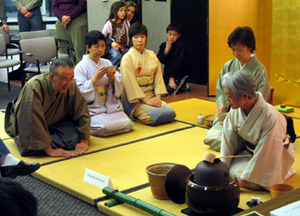A tale of three tea parties: gestures of concern, respect, graciousness

A Japanese Tea Ceremony demonstration at the University of Michigan March 12, 2008.
Photo courtesy of the University of Michigan’s Center for Japanese Studies
At the Japan Cultural Festival last weekend, I slowed down (for once) long enough to watch a Japanese tea ceremony. A younger kimono-clad woman carefully and meticulously prepared and presented a bowl of tea to an older woman. She brewed the water on an old fashioned brazier, scooped the water out with a long-handled bamboo ladle, stirred the tea with a little bamboo whisk and poured the tea into a wide-mouthed bowl. Her body movements were disciplined and deliberate. The older woman sat silently and waited patiently for her tea. The relationship between the women could be read like a dance; the care and respect with which the younger woman made and served the tea to the older woman was moving. Everything was in the details, details that nobody has time for anymore. (And so nice to see during Women’s History Month.) Off to the side of the tatami stage, several kimono-clad women made more of the bitter green tea for the audience members and offered each cup with both hands raised.
I love a good cup of tea, whether in the western tradition (with scones!) or eastern traditions (with me spilling tea all over the table). I love the straightforward no-nonsense way my friend Maneesha makes chai, precisely measuring the milk and casually tossing in the spices. After eating too much at my friend Rabia’s house, I answer yes too quickly when asked if anyone would like some shai. It is the roundness of taste filling one’s mouth, but it is also the gestures of concern and respect in the warming of the teapot and cups, brewing the tea just right, pouring the tea, refilling each cup before it is empty. These small gestures we notice simply because they are so rare these days.
So it was with great dismay that I learned about the recent spitting and racist and homophobic name-calling of our elected Congressmen — Rep. Emanuel Cleaver (D-Mo.), Rep. Barney Frank (D-Mass.), and civil rights icon Rep. John Lewis (D-Ga.)—by members of the Tea Party Movement (so-called “teabaggers” — wait, did they not get the memo from the Middle School principal that teabagging is not allowed?). If people disagree, fine, go ahead and disagree. Debate. Argue. Hey, here is a new one: Vote. However, this level of hate and hostility is amazing, uncalled for, astonishing. House Majority Whip James Clyburn (D-SC) told reporters: "I have heard things today that I have not heard since March 15, 1960, when I was marching to get off the back of the bus." This level of discourse is so low, and it splatters out carelessly and hits all people of color or difference. Of what are they so afraid?
According to McClatchey Newspapers, Rep. Cleaver was spat upon by a Tea Party demonstrator but chose not to press charges. He said, “In a way, I feel sorry for those people who are doing this nasty stuff — they're being whipped up. I decided I wouldn't be angry with any of them.”
In the midst of utter craziness, one small gesture of graciousness and consideration.
Frances Kai-Hwa Wang is a second-generation Chinese American from California who now divides her time between Ann Arbor and the Big Island of Hawaii. She is editor of IMDiversity.com Asian American Village, lead multicultural contributor for AnnArbor.com and a contributor for New America Media's Ethnoblog. She is a popular speaker on Asian Pacific American and multicultural issues. Check out her Web site at franceskaihwawang.com, her blog at franceskaihwawang.blogspot.com and reach her at fkwang888@gmail.com.


Comments
westsidereader
Sun, Mar 28, 2010 : 11:58 a.m.
I was very moved by the comparison and contrast between 2 uses of Tea Party. The first, Chanoyu, is a silent but soul-filling exchange of respect, awe, and embracing of the human connection. No words need be said to appreciate the symbolic gesture of offering connection to humanity and nature through the simple act of making and serving tea. Bitterness is part of human life, and we drink it to remind ourselves of those deep connections. Okakura Kakuzo stated it elegantly in his "Book of Tea." If the new Tea Party movement captures the human condition of hatred, selfishness, intolerance, vindictiveness, fear, violence for the sake of being in the "right" then it is frightening. Mob mentality spills from sports arenas to our safe neighborhoods. The warrior class of the Tokugawa Period were onto something when they realized Chanoyu was a respite from their violent lives. What safety do we have when someone throws Tea in our faces?
jns131
Sun, Mar 28, 2010 : 10:22 a.m.
We walked the botanical gardens in Montreal last summer. Wow. They had a real walking gardens of a Japanese and Chinese Gardens. They also do a tea ceremony as well. We are thrilled that there is one in the state. Not thrilled about the drive, but am looking forward to going in May, the day before Mothers Day. Our April schedule is shot. Thanks for a great article and link to their web site.